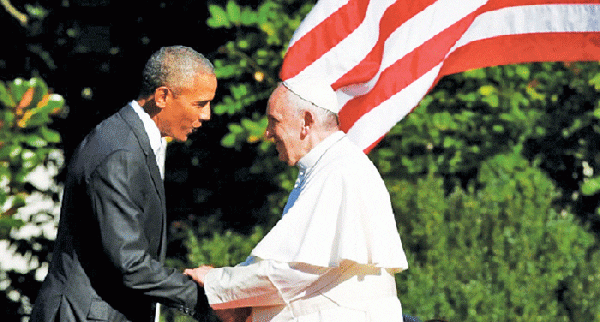
DEARBORN — One may hear “is the pope Catholic?” in response to an obvious question. He is, of course, but during his visit to the United States last week, Pope Francis was not only a representative of the Catholic faith. He brought a message of compassion that appealed to people of all religious beliefs.
Arab and Muslim American activists praised Francis’ message on refugees, immigrants, tolerance and the environment.
Ken Harb, the president of the American Federation of Ramallah, Palestine, said Pope Francis’ call to help refugees was positive and necessary.
“People are fleeing; they need our support,” Harb said. “But what they’re seeing is barbed wire. As a Christian, I see that Jesus was a refugee. His family had to abandon their livelihood in Bethlehem and flee with only the clothes on their backs. We have a responsibility to those escaping persecutions and war.”
He added that as a Palestinian, he found the pope’s message on refugees powerful because millions of Palestinians are forced to live in the diaspora because their families had to leave their homes during the establishment of the state of Israel.
Harb added that the pope is popular among Palestinians of all faiths because of his unscheduled prayer at the wall of separation in the West Bank during his visit to the Holy Land last year.
“I love the fact that the pope stopped at the apartheid wall, where it said, ‘Bethlehem looks like the Warsaw Ghetto,'” Harb said. “That was awesome. It meant so much to Palestinians across the world. What he was praying for is full state recognition— the right to live with freedom and dignity.”
Some right-wing commentators described the pope as anti-capitalist and criticized him for his environmentalist statements. Harb slammed the pope’s critics. He said capitalism is great and it is why people come to the United States.
“But the pope wants us to reflect on our own values,” he said. “He does not want us to misuse our natural resources. He wants us to take care of the poor and help the underprivileged.”
Harb is an Orthodox Christian, but he said he supports the pope’s message.
While acknowledging Pope Francis’ South American background does affect his agenda, Harb said the pontiff is not taking the church is an entirely new direction.
“The Catholic church is always talking about human values,” he said. “But the society we are living in today is different that what it was 30 years ago, so the church is message is different.”
Dr. Muneer Fareed, an Islamic scholar who has chaired several Muslim organizations, said the pope deliberately sent a message that relates to the global wellbeing and human rights, not specifically the Catholic faith.
“Speaking truth to power in this inclusive way, while not saying much about religion and his own religion in particular, allowed him to become the spokesperson of all humanity, not just those who believe,” Fareed said of the pontiff.
Addressing fundamentalism, the pope said, “We know that no religion is immune from forms of individual delusion or ideological extremism.”
Francis was warning against extremism within Christianity, but the statement can also be applied against those who claim that Islam preaches violence and supports terror.
Fareed said the impact of the pope on America’s relation with Islam is minimal because Islamophobia is a “chronic” issue.
“But his impact on religion in the public square is more significant.”
He added that the pope’s South American roots allowed him to address the rights of the underprivileged while avoiding controversial moral issues.
“This papal visit was a success mainly because these two ends of the moral spectrum actually came together quite nicely and made all Americans, not just liberals and Catholics, participants in this moral discourse,” Fareed told The Arab American News.
Ali Baleed Almaklani, the executive director of the Yemen American Benevolent Association (YABA), said the pope’s visit will soothe religious tensions in the United states.
“At a time when anti-immigrant and anti-Muslim sentiments are on the rise, when the head of the Catholic church tells people to be loving, it does make a difference,” Almaklani said. “It is the right massage. I am grateful for his words.”
He added that the pope’s benevolent personality will help combat intolerance in all religions.
Henry Ford College student Ramzi Mankouche said the pope’s compassion embodies the true ideals of his faith as a Christian.
“Those conservative Republican ‘Christians’ need a reality check about what the Christian faith is about,” he said. “It is ironic how they find the pope to be an awful person just for trying to do what Jesus taught us. Pope Francis and Mother Theresa represent what it means to be a true Christian, not Rush Limbaugh and the like.”
Christina Elhaddad, Immigrant Justice Corps fellow at the Arab American Association of New York, said she was happy the pope was able to touch the hearts of non-Christians.
“For example, he was able to rejuvenate the thirst in many Muslims to demand the same leadership from Arab and Muslim religious and political leaders,” she said. “I, as a Catholic Arab, was proud that my two worlds joined for a positive outcome. I hope that his visit truly blessed the minds and hearts of so many people enough to influence positive change that is truly needed in this country.”
Khaled Beydoun, a law professor at Barry University in Orlando, Fla., also praised the pontiff.
“Pope Francis is a transcendent figure,” he wrote on Facebook, adding that the pontiff is a reminder that people can learn from religious leaders outside their faith.
“As a Muslim, his concern for the plight of refugees; the rights of the poor; his emphasis on tolerance and rejection of the institutional groupthink that plagues modern religion speaks directly to the essence of Islam.”






Leave a Reply